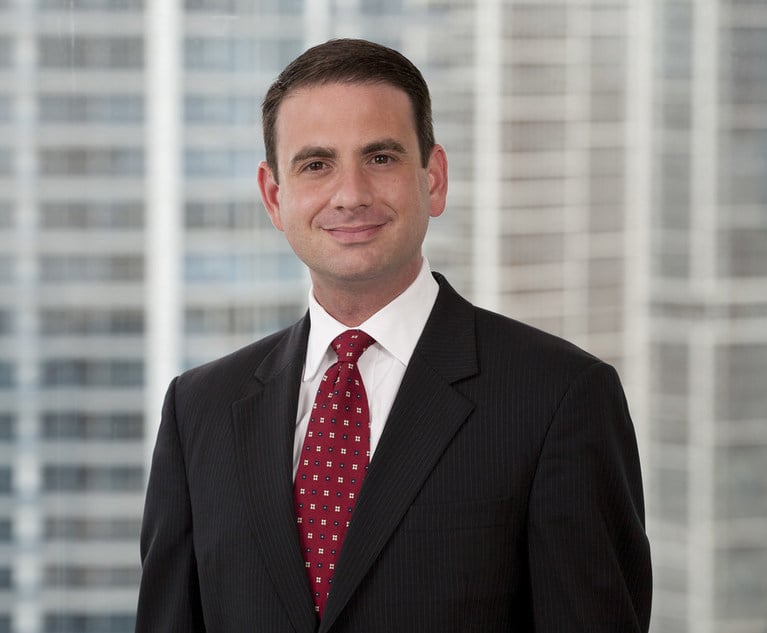 (l-r) Gregory M. Munson, Luna E. Phillips, and Deborah K. Madden, with Gunster.
(l-r) Gregory M. Munson, Luna E. Phillips, and Deborah K. Madden, with Gunster.Florida Business Community: Water Issues to Watch in 2019
The water-related issues are many, and it is important for Florida's businesses to be aware of these developments in 2019 as the changes are being implemented and as public comment periods open.
March 27, 2019 at 09:14 AM
5 minute read
2019 is ushering in a new year with important water issues that will affect Florida's business community. The water-related issues are many, and it is important for Florida's businesses to be aware of these developments in 2019 as the changes are being implemented and as public comment periods open. Developers, farmers, industry and entities seeking new permits or renewals will be interested in these developments. Business owners should be aware of these changes so they are able to identify the significance and impact to their respective businesses.
2018's sweeping set of Florida constitutional reforms included Amendment 6, which reversed the long-standing law that courts and administrative law judges deferred to an agency's interpretation of the law in the agency's subject matter jurisdiction. This old system of agency deference gave weight to the agency's interpretation, and in state permitting and water proceedings, it advantaged a party who was aligned with an agency's interpretation. This freshly adopted amendment has already tipped the balance toward the challenger of agency action, with the First District Court of Appeal's reversal of Florida Department of Environmental Protection's (FDEP) denial of a permit for exploratory drilling in Broward County. After reviewing the statutes anew and finding it was not bound to FDEP's interpretation, the court found the applicant's permit should be granted. Parties may still argue an agency's interpretation of its own law, but judges will no longer be constrained by agency deference in their review. This constitutional amendment will make the outcomes of administrative hearings more uncertain, particularly for businesses who have permits challenged by third parties, because it affords challengers the opportunity to persuade the court in favor of their own interpretation of agency law.
Florida made progress in 2018 in its initiative to assume the federal government's permitting program under Section 404 of the Clean Water Act. If completed, the state of Florida would become the third state (after New Jersey and Michigan) to take over the permitting responsibilities of the U.S. Army Corps of Engineers and U.S. Environmental Protection Agency for Section 404 “dredge and fill” permits. The 2018 Florida Legislature's adoption of Section 373.4146, Florida Statutes, and FDEP's rulemaking efforts established the framework for assuming the program. What remains to be ironed out are the details of the final Memoranda of Agreement between Florida and the Corps and the EPA and the role of the U.S. Fish and Wildlife Service in federally listed species review under the assumed program. Completing Florida's assumption of the 404 permitting program is expected to streamline development permits in both timing and process. If finalized, this delegation effort is widely considered a benefit to businesses who regularly obtain Corps 404 permits.
At the federal level, the EPA is beginning the next chapter in the saga of adopting a definition of “Waters of the United States” or “WOTUS” under the Clean Water Act. At press time, the EPA is proposing a new WOTUS definition that is intended to be easier for a lay person to understand and to recognize the traditional, more limited role of the federal government in the cooperative federalism system. In adopting a new WOTUS definition, the EPA seeks to replace the 2015 Obama administration definition of WOTUS and the preceding definition before that rule, which was largely based on U.S. Supreme Court interpretations. Though the litigation efforts started in 2015, both the pre-2015 WOTUS rule and the 2015 WOTUS rule are being applied, depending on the state in which a project is located. Although more litigation is expected to challenge the EPA's new definition, perhaps the Trump administration's efforts to repeal and replace the 2015 WOTUS rule will result in a more understandable rule being adopted. The business community, including developers and agriculture, generally view the newly proposed WOTUS rule as beneficial because it replaces the expansive 2015 WOTUS rule and the complicated Supreme Court case interpretations in the pre-2015 WOTUS rule with a rule that places more authority in the hands of states, which businesses are more accustomed to working with on their permitting efforts.
Affecting the liquid heart of the state, Lake Okeechobee, the U.S. Army Corps of Engineers is initiating its development of a new Lake Okeechobee regulation schedule, known as the Lake Okeechobee system operating manual (LOSOM). With repairs to the Herbert Hoover Dike which surrounds the lake nearly completed and several comprehensive Everglades restoration projects coming online, the Corps has the opportunity to take advantage of new infrastructure to achieve a more sustainable future for Florida. Adopting a schedule that improves the lake's ability to provide flood control, storage and water supply for all types of users and the environment, will help Florida achieve a better economic and environmental future. The opportunity to mitigate damaging high water releases to the estuaries through additional storage in Lake Okeechobee and emergency estuary protection wells will likely be important to coastal businesses. Businesses rely on the water resources the lake provides, including recreation and water-supply needs.
These developments in water law in 2019 deserve the attention of the business community, as they have the potential to change the status quo for Florida businesses who depend on water permits and water resources like Lake Okeechobee.
Gregory M. Munson is a shareholder in the Tallahassee office of Gunster where he represents regulated industries in the industrial, agricultural, mining and utility sectors in all areas of state and federal environmental law.
Luna E. Phillips is a Florida Bar board certified firm shareholder who practices in the area of environmental, administrative and governmental law. She leads the firm's environmental practice.
Deborah Madden is an associate with the firm whose practice focuses on the area of environmental law.
This content has been archived. It is available through our partners, LexisNexis® and Bloomberg Law.
To view this content, please continue to their sites.
Not a Lexis Subscriber?
Subscribe Now
Not a Bloomberg Law Subscriber?
Subscribe Now
NOT FOR REPRINT
© 2024 ALM Global, LLC, All Rights Reserved. Request academic re-use from www.copyright.com. All other uses, submit a request to [email protected]. For more information visit Asset & Logo Licensing.
You Might Like
View All
Navigating Florida Property Insurance Claims in a Post-Fee-Shifting World
5 minute read

The Eleventh Circuit Will Hear The IMC Petition on the FCC’s One-to-One Consent Rule … Here Is Your Preview!

Applying Neuroscience to Real Estate Development to Address Our Growing Need for Improved Well-Being
10 minute readTrending Stories
- 1Mental Health Issues Don’t Get a Holiday
- 2'It's Got to Be a Wake-Up Call:' Atlanta Attorney Hopes $16M Verdict Spurs Training Changes at Hotels
- 3FTC Bans 'Junk Fees' in Live-Event Tickets and Short-Term Lodging
- 4California Legal Awards Moving to Mid-Summer Date in 2025, Adds New Categories
- 5Law Student Sues NY Attorney Grievance Officials, Seeking Materials Over Sexual Assault Claims
Who Got The Work
Michael G. Bongiorno, Andrew Scott Dulberg and Elizabeth E. Driscoll from Wilmer Cutler Pickering Hale and Dorr have stepped in to represent Symbotic Inc., an A.I.-enabled technology platform that focuses on increasing supply chain efficiency, and other defendants in a pending shareholder derivative lawsuit. The case, filed Oct. 2 in Massachusetts District Court by the Brown Law Firm on behalf of Stephen Austen, accuses certain officers and directors of misleading investors in regard to Symbotic's potential for margin growth by failing to disclose that the company was not equipped to timely deploy its systems or manage expenses through project delays. The case, assigned to U.S. District Judge Nathaniel M. Gorton, is 1:24-cv-12522, Austen v. Cohen et al.
Who Got The Work
Edmund Polubinski and Marie Killmond of Davis Polk & Wardwell have entered appearances for data platform software development company MongoDB and other defendants in a pending shareholder derivative lawsuit. The action, filed Oct. 7 in New York Southern District Court by the Brown Law Firm, accuses the company's directors and/or officers of falsely expressing confidence in the company’s restructuring of its sales incentive plan and downplaying the severity of decreases in its upfront commitments. The case is 1:24-cv-07594, Roy v. Ittycheria et al.
Who Got The Work
Amy O. Bruchs and Kurt F. Ellison of Michael Best & Friedrich have entered appearances for Epic Systems Corp. in a pending employment discrimination lawsuit. The suit was filed Sept. 7 in Wisconsin Western District Court by Levine Eisberner LLC and Siri & Glimstad on behalf of a project manager who claims that he was wrongfully terminated after applying for a religious exemption to the defendant's COVID-19 vaccine mandate. The case, assigned to U.S. Magistrate Judge Anita Marie Boor, is 3:24-cv-00630, Secker, Nathan v. Epic Systems Corporation.
Who Got The Work
David X. Sullivan, Thomas J. Finn and Gregory A. Hall from McCarter & English have entered appearances for Sunrun Installation Services in a pending civil rights lawsuit. The complaint was filed Sept. 4 in Connecticut District Court by attorney Robert M. Berke on behalf of former employee George Edward Steins, who was arrested and charged with employing an unregistered home improvement salesperson. The complaint alleges that had Sunrun informed the Connecticut Department of Consumer Protection that the plaintiff's employment had ended in 2017 and that he no longer held Sunrun's home improvement contractor license, he would not have been hit with charges, which were dismissed in May 2024. The case, assigned to U.S. District Judge Jeffrey A. Meyer, is 3:24-cv-01423, Steins v. Sunrun, Inc. et al.
Who Got The Work
Greenberg Traurig shareholder Joshua L. Raskin has entered an appearance for boohoo.com UK Ltd. in a pending patent infringement lawsuit. The suit, filed Sept. 3 in Texas Eastern District Court by Rozier Hardt McDonough on behalf of Alto Dynamics, asserts five patents related to an online shopping platform. The case, assigned to U.S. District Judge Rodney Gilstrap, is 2:24-cv-00719, Alto Dynamics, LLC v. boohoo.com UK Limited.
Featured Firms
Law Offices of Gary Martin Hays & Associates, P.C.
(470) 294-1674
Law Offices of Mark E. Salomone
(857) 444-6468
Smith & Hassler
(713) 739-1250






